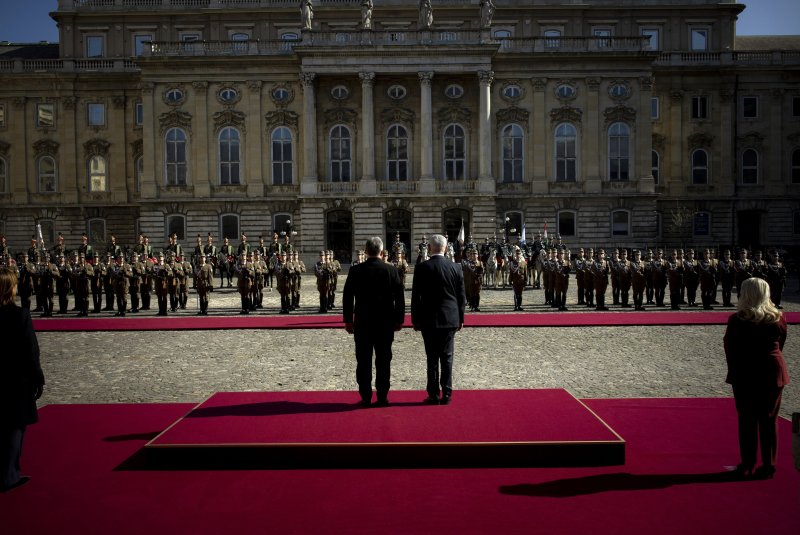Hungarian Prime Minister Viktor Orban pulled out all the stops for Israeli Prime Minister Benjamin Netanyahu (R) at the start of his four-day state visit, including a full military honor guard at Lion’s Court, Buda Castle, in Budapest. Photo by Zoltan Fischer/EPA-EFE
April 3 (UPI) — Hungary said Thursday that it will quit the International Criminal Court it helped found more than two decades ago.
The announcement came minutes before Prime Minister Viktor Orban rolled out the red carpet for Israeli Prime Minister Benjamin Netanyahu, for whom the Hague, Netherlands-headquartered court has an outstanding arrest warrant.
“The withdrawal process will begin on Thursday, in line with Hungary’s constitutional and international legal obligations,” Orban spokesman Zoltan Kovacs said in a post on X.
The decision extricates Hungary from having to blatantly flout the court’s authority by not enforcing the warrant — something Orban made clear was his intention when he extended the invitation for a state visit to Netanyahu in November, a day after the ICC issued arrest warrants for Netanyahu, former defense minister Yoav Gallant and Hamas commander Mohammed Diab Ibrahim Al-Masri.
Neatly sidestepping his obligation to detain Netanyahu and hand him over to the court, Orban instead laid on a lavish reception complete with an honor guard at the historic Royal Palace in Budapest.
Earlier, Netanyahu posted a video on his official account on X of himself and his wife, Sara, being greeted at the airport by Hungarian Defense Minister Kristof Szalay-Bobrovniczky and Israeli Ambassador to Hungary Maya Kadosh.
The court is seeking the arrest of the two Israelis on suspicion of committing war crimes during Israel’s war on Gaza, accusing them of purposely ordering military attacks against civilians, but Orban said bilateral ties with Israel were a higher priority for Hungary and were his “sole consideration.”
Fellow ICC signatory Mongolia set a precedent for Orban’s snub to the 125 member-country tribunal Thursday by not arresting Russian President Vladimir Putin — who is also being sought by the ICC on suspicion of illegally deporting Ukrainian children to Russia — when he visited the East Asian nation in September.
The need for an international court was first recognized in the Convention on the Prevention and Punishment of the Crime of Genocide more than seven decades ago in the aftermath of World War II with the ICC finally coming into being in 2002.
The United States, Russia, China and Israel are among dozens of countries that are not signatories to the Rome Statute establishing the ICC and do not recognize its jurisdiction.
